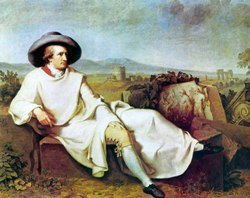
Nina Morgan picks up some useful tips about how to introduce the wonders of geology to a wider public
Geoscientist 21.06 July 2011
These days the combination of interactive museum displays, tick-box worksheets and competitions are often deemed necessary to interest in geology – especially among the young. But in the first decades of the 19th Century, lectures were the tool of choice. Lectures organised by local literary and philosophical societies attracted large audiences – and incidentally, provided a useful additional source of income for geologists such as William Smith. Smith, operating as a double-act with his nephew John Phillips, launched a successful lecturing career, with a series of eight lectures in February/March 1824 in York for the Yorkshire Philosophical Society.
But such orations were not the only fruit. The relatively unknown 'Alnwick' poet John Scafe (1776-1843), shot to fame in 1819 when his long narrative poem King Coal's Levee, or Geological Etiquette, with Explanatory Notes; and the Council of Metals. To which is added, Baron Basalt's Tour, came to the attention of William Buckland (1784-1856), first Reader in Geology at the University of Oxford. In a letter to George Bellas Greenough, Buckand wrote: “My Bookseller in Oxford means to publish it & strike off 1000 copies”. The poem also received a long and fulsome anonymous review in The Literary Gazette and Journal of Belles Lettres, Arts, Sciences, etc. for 1819.
"A levee of primitive rocks; a personification of the densest and most prodigious substances of which our earth's crust is composed; an assemblage of inert immense and shapeless masses; the action of all the mighty matter of geological science, seemed to us, a priori, to defy the power of talent, however fanciful and strong, to range and mingle in any way that would not be forced and unnatural.
"Never were we more pleasantly disappointed; for never did we meet the dulce and util more happily united... the three pieces contained in this small volume, lead us most amusingly through the geology of our island; and while they play, instruct us in the most essential parts of the system which classes, characterizes and describes its various features and stratifications. "
Although some believed that the cast of characters, including King Coal (the mighty hero of the mine), Queen Pyrities, Duke Granite, Marquis Slate, Countess Porphyry, Earl Serpentine, the elder and younger Sandstones, Sir Lawrence Limestone and Baron Basalt, were meant to mock real luminaries of the day (including the monarchy), others took the poem more in the spirit in which it was probably intended.
"... no bard has made the rocks move in so graceful a style as Mr Scafe." wrote the reviewer in The Literary Gazette. German writer and polymath Johann Wolfgang von Goethe praised the poem by saying that it "contains all the knowledge of geology a man wants." And not an interactive touch-screen in sight!
Acknowledgment
Oxford DNB entry for John Scafe by Hugh Torrens; The Geological Lecture Courses given in Yorkshire by William Smith and John Phillips, 1824-1825 by J M Edmonds, Proc. Yorks. Geol. Soc. v40.03, #23, pp373-412, 21 March 1975; anonymous review in The Literary Gazette and Journal of Belles Lettres, Arts, Sciences etc. for 1819, pp723-725; a letter from William Buckland to George Bellas Greenough 26 March 1819, Cambridge University Library.
- The Society is hosting a special free Geology and Poetry day near to National poetry Day in October (Poetry & Geology – a celebration, October 10). Search the Events Calendar on the website for details.
- If the past is the key to your present interests, why not join the History of Geology Group (HOGG)? For more information and to read the latest HOGG newsletter, visit: www.geolsoc.org.uk/hogg, where the programme and abstracts from the Conference on Geological Collectors and Collecting are available as a pdf file free to download.
* Nina Morgan is a geologist and science writer based near Oxford.